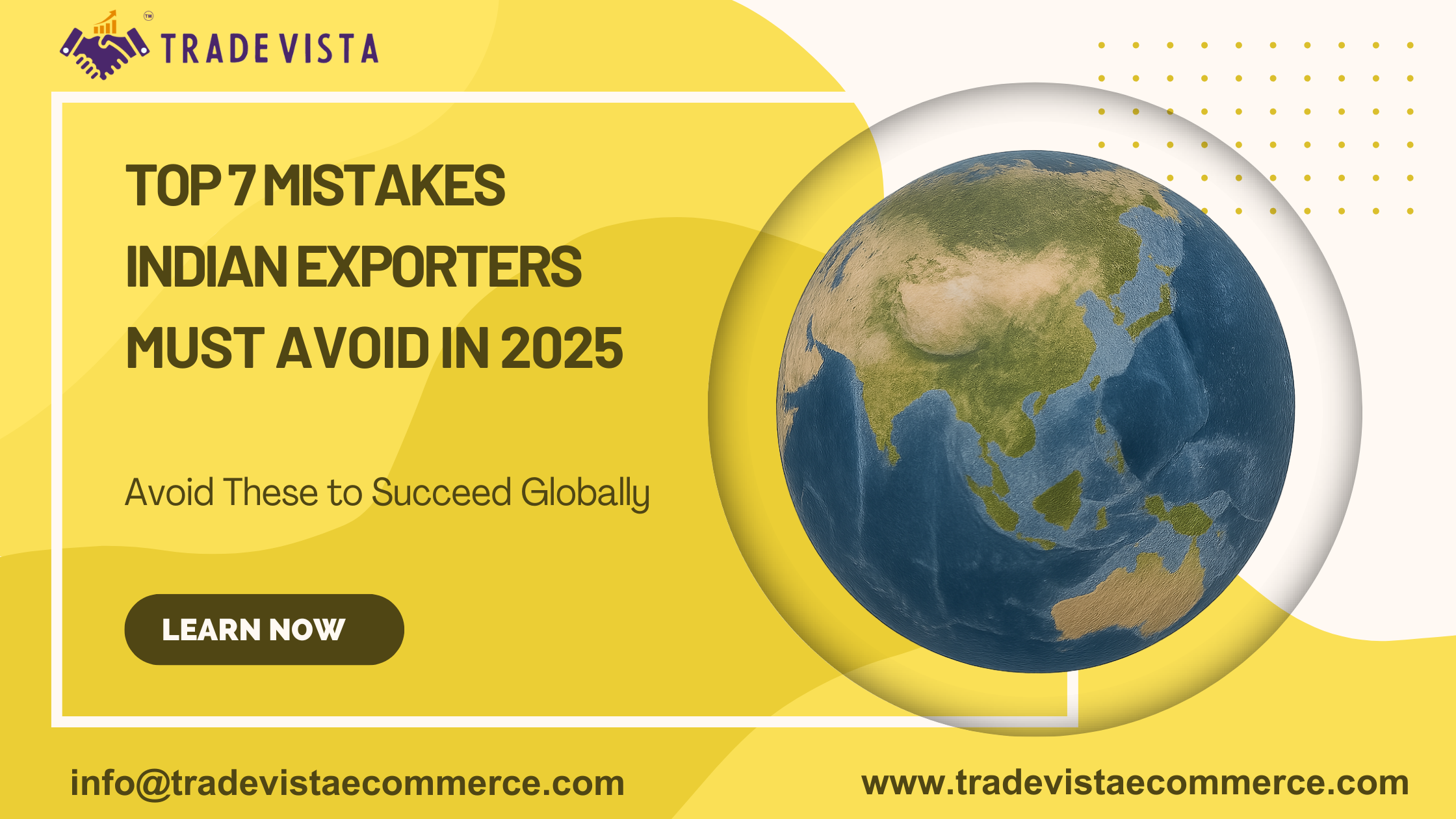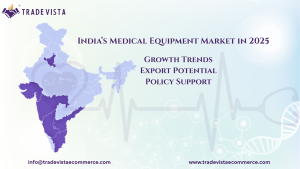Indian exporters are riding a global wave of opportunity in 2025, from demand for handmade crafts in Europe to the rise of food exports to the Middle East. But while opportunities grow, so do the risks of costly mistakes that can damage reputations and delay payments.
Whether you’re a first-time exporter or already shipping globally via platforms like Alibaba.com, knowing what to avoid is as important as knowing what to export. From poor documentation to ignoring payment safety nets, here are the top 7 export mistakes you must avoid to succeed globally.
Poor Documentation Handling
Why It Happens
- Rushing to dispatch goods without cross-checking.
- Lack of clarity about the required export documents.
- Inexperienced CHA (Customs House Agent) or internal team.
Consequences
- Shipment delays or rejections at customs.
- The bank is refusing export proceeds due to mismatched documentation.
- Penalties under FEMA or GST laws.
How to Avoid It
- Maintain a document checklist: IEC, Commercial Invoice, Packing List, Bill of Lading, Certificate of Origin, AD Code, Shipping Bill, GST e-way bill.
- Hire an experienced CHA or consultant.
- Export management software or CRM can be used to automate tracking.
Under-Invoicing to Evade Duties
Why It Happens
- To reduce GST or show lesser revenue on the books.
- Advice from unregulated middlemen or agents.
Consequences
- Heavy fines by the Customs or the GST Department.
- Frozen IEC or blacklisting.
- Buyer is losing trust due to a compliance mismatch.
How to Avoid It
- Stick to honest invoicing — remember, RoDTEP benefits are given on the FOB value declared
- Declare full price and claim legitimate tax refunds.
- Keep proper digital records of price quotations and email trails.
Ignoring Letter of Credit (LC) Terms
Why It Happens
- Exporters often assume the bank will take care of the LC details
- Many fail to match shipment documents to LC terms.
Consequences
- The bank refuses to release the payment.
- Breach of contract with the buyer.
How to Avoid It
- Review LC terms with your bank before shipment.
- Match document names, shipment dates and product descriptions exactly.
- A professional freight forwarder or export consultant is used to prepare LC-compliant documents.
No Trade Assurance or Payment Guarantee
Why It Happens
- Blind trust in international buyers
- Skipping formalities for quick deals
Consequences
- Non-payment or part-payment.
- Lengthy legal disputes in foreign jurisdictions.
How to Avoid It
- Use Alibaba Trade Assurance or Escrow Services
- For large orders, insist on LC (Letter of Credit) or Advance Payment.
- Always sign a formal sales agreement with terms like INCO, payment timeline, penalties.
Not Verifying Buyer Authenticity
Why It Happens
- Inexperience or desperation to close the deal
- Overreliance on unverifiable inquiries from email or WhatsApp
Consequences
- Fraudulent buyers vanish after receiving the Proforma Invoice.
- Scams involving fake payment slips or shipping agents
How to Avoid It
- Verify the buyer via:
- Embassy trade sections
- LinkedIn & Alibaba profiles
- D&B credit reports
- Start with a small sample order with 100% advance.
Misunderstanding Incoterms
Why It Happens
- Exporters quote DDP or CIF without calculating costs
- Lack of awareness of shipping responsibilities
Consequences
- Exporter ends up paying hidden freight or insurance costs.
- Buyer disputes over delivery responsibility.
How to Avoid It
- Learn common Incoterms: FOB, CIF, EXW, DDP
- Use Incoterms calculators to estimate the full cost.
- Quote only what you’re confident in delivering.
Neglecting Export Incentive Claims
Why It Happens
- Exporter unaware of schemes.
- The shipping bill was filed without the correct scheme codes.
Consequences
- Loss of benefits like RoDTEP, TMA, and Interest Equalization
- Reduced profitability
How to Avoid It
- File shipping bills with RoDTEP / MEIS benefit codes
- Submit claims on ICEGATE within prescribed deadlines.
- Keep in touch with your Export Promotion Council (EPC)
Mistakes, Impacts & Solutions
Mistake | Consequences | How to Fix It |
Poor Documentation | Shipment delays, penalties | Use the expert CHA checklist |
Under-Invoicing | Blacklisting, tax penalties | Declare real value, claim RoDTEP |
Ignoring LC Terms | Payment delays, LC rejection | Match documents to LC |
No Trade Assurance | Non-payment, legal issues | Use Alibaba Trade Assurance / LC |
Unverified Buyer | Fraud risk | Verify via embassy, LinkedIn, D&B |
Incoterms Confusion | Cost losses, delivery disputes | Learn EXW, FOB, CIF, DDP |
Missing Incentive Claims | Loss of refunds/incentives | File timely on ICEGATE with EPC help |
Exporters who integrate digital tools (like Alibaba.com dashboards, CRM systems, ICEGATE tracking, and online documentation portals) are less likely to fall into these traps.
Success in exports isn’t just about having a good product — it’s also about avoiding these seven mistakes that can derail even the most promising deal. In 2025, global buyers expect professionalism, compliance, and transparency.
If you’re unsure about any step in your export journey — be it documentation, trade assurance, or digital onboarding on platforms like Alibaba.com — reach out to TradeVista’s export advisory team for a free consultation.
FAQs – Avoiding Export Pitfalls in 2025
What are some early signs that my international buyer may not be genuine?
Early red flags include using only free email addresses, avoiding video calls, refusing written contracts, or pushing for urgent shipment without payment. Always conduct due diligence before confirming large orders.
Can I export without a physical office or warehouse in India?
Yes, many exporters operate digitally from home or co-working spaces. However, you still need a valid business address for IEC, GST registration, and bank communication.
Can we rely only on WhatsApp or email for international deals?
No. While these are great for initial communication, formal contracts, invoices, and payment terms should be documented and signed through email or secure platforms.
What is the safest payment term for a first-time export deal?
100% Advance or a small sample order with full advance is safest for first-time deals. You can move to a Letter of Credit or a 30:70 payment structure as trust builds.
Do I need to register with an Export Promotion Council (EPC)?
Membership in the relevant EPC (like EEPC, FIEO, or APEDA) is essential if you want to claim government export incentives like RoDTEP or the Interest Equalization Scheme.
How can I keep track of multiple export orders and deadlines?
Use a CRM or export order management system. Platforms like Zoho, Export Genius, or even Excel with reminders can help you avoid errors and meet buyer deadlines.
What’s the penalty if I export without GST registration?
Under the GST Act, you may face seizure of goods, denial of IGST refund, and fines. Even if exempt under turnover, GST registration is recommended for exporters to claim refunds.
Should I work with a freight forwarder or handle logistics myself?
Working with a freight forwarder is safer for new exporters. They manage shipping, customs clearance, and documentation, reducing the chances of procedural errors.
Is using a third-party manufacturer legal and still exporting under my brand?
Yes, this is called merchant exporting. You can export without owning the manufacturing unit if your documents clearly state your role and GST invoices are aligned.
How often should I update myself on export policies or schemes?
At least once every quarter. Subscribe to DGFT updates and EPC newsletters and follow reliable trade portals like www.indiantradeportal.in or ICEGATE.




